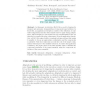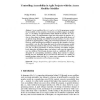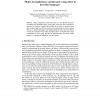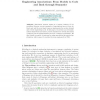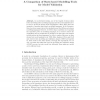121
Voted
TOOLS
2008
IEEE
15 years 9 months ago
2008
IEEE
Abstract. A popular approach to compositional verification of component-based applications is based on the assume-guarantee paradigm, where an assumption models behavior of an env...
116
Voted
TOOLS
2008
IEEE
15 years 9 months ago
2008
IEEE
In this paper, we introduce MaDcAr, a model of engines for dynamic and automatic (re)assembling of component-based software. In MaDcAr, an application description consists of the d...
123
Voted
TOOLS
2008
IEEE
15 years 9 months ago
2008
IEEE
113
Voted
TOOLS
2008
IEEE
15 years 9 months ago
2008
IEEE
Access modifiers like public and private let the programmer control the accessibility of class members. Restricted accessibility supports encapsulation, i.e., the hiding of impleme...
110
Voted
TOOLS
2008
IEEE
15 years 9 months ago
2008
IEEE
Programming in an object-oriented language demands a fine balance between high degrees of expressiveness and control. At one level, we need to permit objects to interact freely t...
113
Voted
TOOLS
2008
IEEE
15 years 9 months ago
2008
IEEE
Object composition is often advocated as a more flexible alternative to standard class inheritance since it takes place at run-time, thus permitting to specialize the behavior of ...
115
Voted
TOOLS
2008
IEEE
15 years 9 months ago
2008
IEEE
Association between classes is a central construct in OO modeling. However, precise semantics of associations has not been defined, and only the most basic types are implemented i...
116
Voted
TOOLS
2008
IEEE
15 years 9 months ago
2008
IEEE
There is a growing research interest in employing the logic paradigm for making queries on software in general, and OOP software in particular. We describes a side-effect-free tech...
128
Voted
TOOLS
2008
IEEE
15 years 9 months ago
2008
IEEE
Abstract. Many real-time systems use runtime structural reconfiguration mechanisms based on dynamic creation and destruction of components. To support such features, UML-RT provid...
117
Voted
TOOLS
2008
IEEE
15 years 9 months ago
2008
IEEE
In model-based testing, one of the biggest decisions taken before modelling is the modelling language and the model analysis tool to be used to model the system under investigation...

